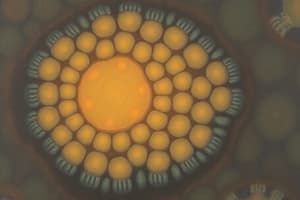Podcast
Questions and Answers
What is the primary function of the cell membrane?
What is the primary function of the cell membrane?
- Controlling the movement of molecules in and out of the cell (correct)
- Translating genetic information into proteins
- Generating energy through cellular respiration
- Containing the cell's genetic material (DNA)
Which organelle is responsible for generating energy in the form of ATP through cellular respiration?
Which organelle is responsible for generating energy in the form of ATP through cellular respiration?
- Mitochondria (correct)
- Nucleus
- Cytoplasm
- Ribosomes
Where is the cell's genetic material (DNA) located?
Where is the cell's genetic material (DNA) located?
- Cytoplasm
- Mitochondria
- Ribosomes
- Nucleus (correct)
What is the jelly-like substance that surrounds the cell nucleus and contains various organelles and structures called?
What is the jelly-like substance that surrounds the cell nucleus and contains various organelles and structures called?
What are the structures involved in protein synthesis, translating genetic information into proteins?
What are the structures involved in protein synthesis, translating genetic information into proteins?
What is the main difference between mitosis and meiosis?
What is the main difference between mitosis and meiosis?
What is the role of cell signaling?
What is the role of cell signaling?
What is the process of differentiation?
What is the process of differentiation?
What is the purpose of apoptosis?
What is the purpose of apoptosis?
What is the function of cell junctions?
What is the function of cell junctions?
Flashcards are hidden until you start studying
Study Notes
Cell Biology: The Foundation of Life
Cell biology is a crucial area of study within the broader field of biology, focusing on the structure, function, and behavior of cells. This interdisciplinary field of study draws from various scientific fields, including biochemistry, genetics, and microbiology, to gain a comprehensive understanding of the intricate processes that occur within cells.
Cell Structure and Function
At the core of cell biology lies the study of cell structure and function.
- Cell membrane: This structure is composed of lipids and proteins, and its primary function is to control the movement of molecules in and out of the cell.
- Cytoplasm: This is the jelly-like substance that surrounds the cell nucleus and contains various organelles and structures that perform specific functions within the cell.
- Nucleus: This structure contains the cell's genetic material (DNA) and plays a central role in cell processes such as cell division and gene expression.
- Mitochondria: These organelles are responsible for generating energy in the form of ATP through cellular respiration.
- Ribosomes: These structures are involved in protein synthesis, translating genetic information into proteins.
Cell Division and Growth
Cell division and growth are essential processes for the maintenance and growth of multicellular organisms.
- Mitosis: This process involves the duplication of the cell's genetic material and the subsequent division of the cell into two identical daughter cells.
- Meiosis: This process occurs in the formation of sex cells (sperm and egg) and involves the halving of the cell's genetic material, resulting in haploid gametes.
- Apoptosis: This programmed cell death is a natural process that helps maintain the balance of cells in the body by removing damaged or unwanted cells.
Cellular Processes
Cellular processes play a crucial role in the maintenance and function of cells.
- Cell signaling: This process involves the transmission of signals between cells, often through the use of chemical messengers, and is essential for cellular communication and coordination.
- Transport: This process involves the movement of molecules across cell membranes and is facilitated by various transporters and channels.
- Cell death: This process occurs when a cell is no longer able to function properly and is removed from the body through processes such as apoptosis or necrosis.
Cellular Regulation
Cellular regulation is the process by which cells control their own behavior and function.
- Gene expression: This process involves the regulation of the transcription and translation of genetic information, ultimately controlling the production of specific proteins.
- Cell cycle: This process involves the control of cell division, ensuring that cells divide only when it is appropriate and necessary for the growth and maintenance of the organism.
Cellular Interactions and Communication
Cells often interact with one another and communicate through various mechanisms.
- Adhesion: This process involves the attachment of cells to one another or to extracellular structures, often mediated by specific proteins and receptors.
- Cell junctions: These structures allow for direct communication between cells and can serve to strengthen the connection between cells.
- Cell signaling: As mentioned earlier, this process involves the transmission of signals between cells, often through the use of chemical messengers.
Cellular Adaptation and Response
Cells have the ability to adapt and respond to changes in their environment.
- Stress response: This process involves the activation of various cellular pathways and mechanisms in response to environmental stressors, such as heat, cold, or toxins.
- Differentiation: This process involves the development of specialized cell types from a common precursor cell, often in response to specific environmental cues or signals.
Cellular Evolution
The study of cell biology also contributes to our understanding of evolution.
- Endosymbiosis: This process involves the incorporation of one organism into another, often leading to the formation of new organelles or cell structures.
- Cell fusion: This process involves the merging of two or more cells to form a single, hybrid cell, often resulting in the formation of specialized cell types.
In conclusion, cell biology is a fascinating and complex field of study that provides valuable insights into the structure, function, and behavior of cells. This knowledge is essential for understanding the biological processes that underpin the growth, development, and maintenance of living organisms, as well as the evolution of life on Earth.
Studying That Suits You
Use AI to generate personalized quizzes and flashcards to suit your learning preferences.



